#and the mental impact is so often overlooked
Explore tagged Tumblr posts
Text
guys if i'm being so real. being diabetic IS having an eating disorder. like, there is no way of being diabetic that does not include disordered eating. and that's not even counting the diabetes-specific eating disorders that we have names for, like diabetic bulimia. like i feel like there should be a name for the relationship between the diabetic, the food that they eat, and the body they put it in. but right now we just call it "diabetes" and it's just a washed over part of the process of being alive with this shit
#diabetes#actuallydiabetic#t1d#mine#got a pump a couple days ago and whew#is it bringing back all the classic diabetic disordered eating habits#that i have clawed my way out of hell to be rid of#(its always gonna be something bc being diabetic means#u can never just address the body's hunger signals. u can't just eat when ur hungry like everyone else)#and the fact that these habits are ENCOURAGED by medical professionals#and the mental impact is so often overlooked#sigh.
130 notes
·
View notes
Text
Writing Notes: Tactics of Persuasion
Phantom dreams
Story-telling
Tailored pitches
Source credibility and authority
Social consensus and social identity
Scarcity
Information control
Self-generated persuasion
Commitment
The rationalization trap
Phantom Alternative
An option that looks real, is typically superior to other choices, but is unavailable (Pratkanis & Farquhar, 1992).
The key to selling a flimflam (i.e., the selling of pseudoscience, fringe science, and other questionable claims) is to sell the phantom as real and possible and something that can be obtained with the right belief, effort, and, of course, money, but, in reality, it is a false dream.
The sale of a phantom begins by creating ostensible solutions to satisfy our most basic needs and desires.
As such, phantoms often purport to provide things such as:
Health (quack cures, diets, “healing” rituals, mental health pseudoscience, psychic surgery, faith healing).
Wealth (get-rich-quick schemes, lucky lottery numbers, investment fraud).
Social popularity (weight loss regimes, love potions, dating and romance fraud, becoming an “expert” with “secret” knowledge about UFOs, the Loch Ness Monster, and the moon landing).
Fear of death and the end of our existence (séances, life-after death claims).
Reduction in the anxiety of life’s uncertainties (advice given by horoscopes, astrology, psychic mediums, and other means, phrenology, psychic detectives, conspiracy theories that “make sense” of the world and the desires and feelings of those who spread them).
It is relatively easy to create a phantom since it does not actually need to solve these needs, but just appear to do so.
Compounding the problem, it’s often difficult to spot the real from the fake course of action without the needed knowledge, expertise, and critical thinking skills.
Although a phantom dream is imaginary, its impact on our behavior is quite real.
Story-Telling: The Invented Ruse
To allay our concerns, the seller of flimflam invents a ruse or story to make the fake look real (Bell & Whaley, 1991; Clark & Mitchell, 2019)
A good narrative:
helps to guide our thoughts (e.g., the cure is natural and traditional),
determines the credibility of information (e.g., as a natural cure, this makes sense), and
ultimately directs evaluation and choice (e.g., it works for Native Americans and Quakers, why not me?).
As such, stories cement information in our mind and tend to persist even in the face of strong, discrediting information (Anderson et al., 1980; see Pratkanis (2007) for the use of stories in influence).
Tailored Pitches
Fake healers can use the technique of pre-show to gather needed information.
For example: Before the healing event, attendees can fill out prayer cards with their healing requests and other information.
During the service, the fake healer can call out names and appear, by purported divine intervention, to know the person’s illness and personal life story.
Typically, the fake healer will “cure” shills (plants who fake illnesses) and those with painful health problems for which the pain can be overlooked in the excitement of the moment. The prayer cards (along with Googling and social media) provide the needed information.
Source Credibility and Authority
Two of the most robust research findings in social psychology are as follows: (a) we tend to listen to those who are credible (expert and trustworthy) sources (Hovland et al., 1953); (b) we tend to obey authorities (Milgram, 1974).
The merchant of flimflam leverages these 2 basic human tendencies by creating a persona as a credible authority and then using that persona to hawk a phantom.
Social Consensus and Social Identity
Flimflam merchants will use our social relationships to sell their phantoms by employing the influence tactics of social consensus and social identity.
When we see other people doing something, we are more likely to do the same through the conformity created by social consensus – if everyone is doing it, it must be the right thing to do.
Social consensus engages 2 psychological processes that promote conformity (Deutsch & Gerard, 1955):
information or social proof (“if other people are doing it, it must be correct”; Cialdini, 1984) and
normative influences or social pressure to agree or go along with the group (“I don’t want to be different from the group”; Asch, 1951).
The seller of flimflam will manufacture a false consensus (or take advantage of an apparent one). Quack remedies, astrological readings, unproven Covid treatments, get-rich schemes often feature testimonials of people who speak to the “value” of the product.
Once we become engaged with a flimflam, it can provide us with a desired social identity or a sense of who we are based on our reference group memberships, whether they be real or aspirational (Abrams et al., 1990; Kelley & Volkart, 1952; Tajfel, 1981).
Scarcity
Another social influence tactic to make a flimflam look desirable is to make it look scarce (Cialdini, 1984).
Given that phantoms are generally rare, this is rather easily accomplished.
As an effective social influence tactic, scarcity:
plays on a rule in our head, “if it is rare, it must be valuable”;
creates a sense of urgency and panic that we need to act now and feeling of frustration (reactance) when we do not obtain the phantom; and
inflates our feelings of uniqueness and self-worth when we obtain something that is rare (Pratkanis, 2007).
Information Control: False Accusations, Projection, and Doubt Campaigns
The sellers of flimflam often encounter scientists, journalists, magicians, lawyers, informed citizens, and other “do-gooders and crusaders” who use evidence and reason to point out false claims made in selling the phantom.
If left to stand, these criticisms can cut into sales and deflate the entire scheme. As such, the flimflam merchant needs to control the information environment and can do so using at least 3 techniques:
First, the peddler of a flimflam can falsely accuse the critics. Such attacks can be effective because it can result in a negative impression of the target of attack, undermining their reputation (Wegner et al., 1981). In addition, such allegations set up a chilling, coercive effect as others may become fearful of speaking out.
A second information control tool for the flimflam merchant is a variant of the false accusation known as the projection tactic – accusing others of the misdeed you are doing (Rucker & Pratkanis, 2001). In research, we find that a projection attack: (a) focused attention on the accused and away from the person making the accusation, (b) increased the blame placed on the target of projection, and (c) decreased the culpability of the accuser, making the accuser look good and moral for raising such issues. The effects of projection persisted despite attempts to raise suspicions about the motives of the accuser and providing evidence that the accuser was indeed guilty of the deeds.
A third approach to controlling the information environment is through a doubt campaign (Michaels, 2008; Oreskes & Conway, 2010). The purpose of a doubt campaign is not to convince someone of something (say, the value of the flimflam) but instead to raise doubts and confusion about the facts with the goals of (a) making it difficult to know the truth, (b) creating the impression that there is a controversy (when there is little or none), and (c) forestalling any action until the “controversy” is resolved. The doubt campaign was pioneered in the 1950s and 1960s by tobacco companies seeking to dissuade consumers that their products were harmful, but now is used to create doubt and confusion on such issues as climate change, the efficacy of vaccines such as those preventing childhood illnesses and COVID-19, the value of masks for limiting the spread of COVID-19, and evidence against various conspiracy theories.
Self-Generated Persuasion
One of the most effective means of influence is to have the target generate arguments in support of a position and thereby persuade her- or himself (Boninger et al., 1990; Lewin, 1947).
Self-generated persuasion is effective because in essence it asks the target to think up good reasons for a proposition and to refute any counter argument.
This self-generated message comes from a source that is considered credible, trustworthy, respected, and liked – ourselves.
Commitment
In order to establish continued advocacy and use of a flimflam, the seller needs to secure a commitment, especially a public one, from the target.
With a public commitment, a person is linked to a behavior or course of action – in this case, advocating for and using a flimflam.
Breaking this binding produces a negative tension of not living up to one’s promises and a concern that one will look inconsistent and untrustworthy (e.g., a need to save face). As such, securing a commitment increases the likelihood that the target will comply and perform that behavior (Brockner & Rubin, 1985; Salancik, 1977; Staw, 1976).
Commitments are strongest when the behavior is public/visible, irreversible, and perceived to be freely chosen.
One method for securing a commitment is through the use of the foot-in-the-door tactic (Freedman & Fraser, 1966).
Flimflam is rampant on social media, and we can easily see why.
Social media, with its emphasis on engagement (liking, reposting, posting, commenting, posing, arguing) provides many opportunities to make public, irreversible, and freely chosen commitments (as well as to allow those commitments to be used to create the appearance of social consensus as to the value of the flimflam).
While making a commitment increases compliance, it also results in perhaps the most important ingredient in selling a flimflam: setting a rationalization trap.
The Rationalization Trap
Once a person is sold on a flimflam, and especially when he or she comes to purchase and publically advocate for the phantom option, it changes the way a person processes information.
No longer is the goal “to find things out” but instead to defend and justify the beliefs and actions in what can be called a rationalization trap (Festinger, 1957; Pratkanis & Shadel, 2005; Tavris & Aronson, 2007).
When a person holds 2 discrepant thoughts, what social psychologists call cognitive dissonance, it results in an aversive tension state with painful implications for the self.
In such a state, we are highly motivated to reduce the dissonance.
Of course, one way to reduce the dissonance is to admit a mistake – I was wrong about the cure – and to take responsibility for one’s actions by alerting others and rejecting or, at least scrutinizing more carefully, the source of the disinformation about the quack COVID-19 treatment.
While a mature response and what science requires (Feynman, 1985), it is often difficult to take this route to dissonance reduction, especially when we have made public commitments, self-generated arguments, and linked our social identities to the flimflam, in this case, the quack cure.
Admitting a mistake often is taken to mean – to ourselves and to others – that we are not a good and capable person.
After all, we were unable to see through the deception and then told others to do something that might damage their health.
Unfortunately, an all-too-often course of action is to dig in our heels further and to rationalize and justify our behavior.
Some common ways to do this include:
deny the evidence (“the data showing the ineffectiveness of the cure is made-up”),
take some irrelevant aspect of the disagreeable research and pretend that it is damning (“the study was only done in New York”),
derogate the source (“that’s from the biased media and the doctors’ union”),
derogate others who expose the quackery (“nurses and doctors don’t care about people”),
perform a selective information search (search out and spread any study or claim no matter how unreliable that supports one’s position),
keep repeating discredit research as if it is true, bolster one’s own self and one’s intuition as a way of knowing (“I can see through the media; I did my research unlike those duped by big pharma”),
derogate other forms of knowing, particularly science and reason (“science is a limited way of knowing unlike my intuition”),
use whataboutism (“what about the time Fauci might have said something wrong”),
seek external justification (“a cure that might work is better than having to wear a mask”), and, perhaps worst of all,
self-censorship of putting ourselves in an information bubble where we only hear agreeable information and anything disagreeable is either not heard or ridiculed.
Obviously, a rationalization trap is a very effective means of selling a flimflam.
Once we are in the trap, we will continue to buy the flimflam and advocate for the phantom option in an attempt to justify ourselves in the face of failing evidence.
A key component of being an active truth-finder is to have a plan for evaluating and making decisions about claims.
When we do make a mistake, the honorable thing to do is to admit the error and take responsibility for our actions.
Source ⚜ Reading Scientific Articles ⚜ False Claims ⚜ Writing Resources PDFs
#persuasion#psychology#writeblr#writing reference#literature#writers on tumblr#spilled ink#dark academia#writing prompt#creative writing#science#communication#writing inspiration#writing resources
257 notes
·
View notes
Note
this is like random but I’m glad the fandom has recognized jackie’s depression and passive suicidal ideation moreso now because a lot of conversation around her death ignores that alongside the role of her being horrified/disgusted at the events of doomcoming. it’s usually to sort of absolve the girls (mostly shauna) potential role in her death blaming it solely on Jackie’s refusal to come inside but I feel like that’s just a cop out and that people tend to overlook that jackie was Also a teenage girl in the wilderness dealing with mental health issues, to once again absolve their fave characters.
this is gonna turn into a rant if I don’t cut myself off but it’s why I largely appreciate jackienat as a ship as well because there’s clear care for jackie as a character whereas some jackieshaunas will ignore the unsavory parts particularly of how shauna impacted jackie’s mental health toward the end, in favor of shauna despite that being important to their relationship and shauna’s guilt (which isn’t just unfounded or survivor’s guilt)
okay so i accidentally went on a tangent and may have lost the plot of your ask - but i think you'll agree with this? idk. i hope so
jackie's suicidal ideation is something that was shown so well. and i almost think it was shown *too* well in that - it's easy to miss it if you don't know what to look for. imo that's part of why it's so overlooked.
jackie often gets passed off by the fandom (and the girls) as being lazy and not adapting. she's grumpy, whiny, and doesn't try the way the others do. but in reality - jackie just doesn't register any chance of survival.
when shauna tries to help her adapt, jackie says "i don't belong here, and i don't know how much longer i can keep doing this."
on the surface level, yes, jackie means the wilderness - but she's speaking in a greater sense. none of the girls belong in the wilderness but jackie also knows she doesn't fit in amongst the other girls
(we see this in the pilot with how she lingers before giving her locker room pep-talk. she has to script out her interactions and even then, is rejected when she says the wrong thing. again, before the party -jackie tries to help shauna by suggesting the red dress and mentioning randy - but shauna shoots her down. in both instances, jackie doesn't know what she's doing wrong, but she knows she's making mistakes. from the get-go, jackie is deeply insecure and doing her best to hide it)
on top of the isolation - jackie was depressed before even getting on the plane (again - we can infer from her reaction to the scene with jeff and the general contrast in her character. she's stoic and withdrawn when we se her alone and masking heavily around her friends) so when it crashed, the only thing keeping her going was shauna.
everything jackie did in the wilderness was motivated by her. she gave up the last of her food when shauna almost fainted. and even when she slut-shamed nat - it wasn't because she hated her or wanted to be a bitch. it was because nat wasn't bringing back food and shauna had almost passed out from hunger.
in jackie's last few episodes, she's withdrawing from the other girls. she's becoming more combative - essentially burning any bridges she has left. she's making it easier to eventually kill herself. she won't feel bad about leaving if nobody around her will miss her.
and like you said - shauna did a lot to hurt jackie's mental health that the fandom ignores. she refused to communicate with her despite jackie constantly trying to start a conversation. she lied to her about jeff. and during doomcoming - she not only terrorized jackie with the rest of the girls, but she never apologized. she straight up saw lottie lock jackie in a closet and did nothing because she was on lottie's side.
jackie's refusal to come inside was so many things and yes, some of it was her being a stubborn teenage girl. but it was more than that. it was a girl who was content with the fact that - either shauna would come get her and everything would be okay again, or she would die out there. it was someone who was actively in the process of trying to starve to death. someone who figured: if death is inevitable, she might as well take it into her own hands.
49 notes
·
View notes
Text
Talon & Secret Talents (Headcanons) Super indulgent, but these are what I think the members of Talon would have their secret talent as. My asks are open and requests are welcome, enjoy (they're under the cut c:)
Akande Ogundimu / Doomfist: I can honestly imagine Akande being incredibly good at Luthiery, which is crafting and repairing string instruments like guitars and violins. He taught himself years ago, and has continued honing his skills, modifying instruments and making them out of unconventional materials just to prove to himself he can do it. It's something Akande takes great pride in, serving as a way for him to relax with something mindless and meticulous.
Gabriel Reyes / Reaper: Gabriel has a secret talent for wine and beer making, often spending months at a time making some for his wife, or his colleagues for their birthday. He'll never tell them that he made it, just that it was the cheapest in the store to throw them off his track. Gabriel was taught by his dad how to, and has since loved making it out of ingredients that you wouldn't expect, like sugary sweets or caffeinated drinks. He enjoys the time spent carefully watching it brew, spending weeks to months focused on making sure it tastes divine.
Moira O'Deorian: Honestly I like to think that Moira's good at embroidery, especially cross stitching. She was taught how to do it by her mother, who was taught by their mother and so on. It's a family gift, and she values the time spent carefully making beautifully woven creations. She used to fabric dye too, taking her time with an airbrush to make the most beautiful Ada for people to buy from her. It's her secret hobby, and it helps her to unwind especially if she can't sleep that night.
Siebren de Kuiper / Sigma: Siebren's always enjoyed writing, finding it to be the best way to express his thoughts and feelings. Over time, his writing has become more erratic, scattered, and incoherent. It's something that weighs on his mind from time to time, but he enjoys reading back his older works, like diary entries or poetry he's written. It fills him with a hope of returning to that mental state, and writing in and of itself helps him to clear the echoing thoughts that linger each day.
Amelie Lacroix / Widowmaker: Amelie has always loved dressmaking, and considers herself to be a talented seamstress. She's always enjoyed it, and it's something even Talon wouldn't be able to pry from her hands. Amelie made her wedding dress, cocktail dresses for parties, and likes to make new patterns for future designs as often as possible. It's something meticulous, and helps to focus her mind on something that won't impact her negatively. Often, Moira and Olivia will ask Amelie to make them designs that she thinks would compliment them, but wouldn't expect her to make the dress completely for them, often tailoring it to be absolutely perfect on them. It's not as much of a secret talent as she'd like it to be, with Moira and Olivia being the only people that know about it. However, she values their opinions on her work, and appreciates the way they express their gratitude over the dresses she makes for them. It makes her feel as though she has a purpose again; one that doesn't have a road of dead bodies following her.
Olivia Colomar / Sombra: Olivia's scarily gifted at photography and photo editing. She has a secret blog and secret twitter to share her creations, to conceal her identity and prevent anyone finding them. Her works are based on her traumas, and the things going on in Dorado that she can't prevent. They're often thought provoking, bringing light to the things that people often overlook. She likes to add an element of hope into the images, and likes to add a line that adds to the work to each post. They're not popular by any means, with rarely anyone interacting with them, but she doesn't care - as long as someone's documenting the way her home is being destroyed by the violence, she's content. It's something she intends to keep private, and she doesn't want to attach her face or name to the images she's creating.
Maugaloa Malosi: Maugaloa has a talent for memorising and recalling information - even when he was a child, he was applauded for his ability to recall exact details of the smallest things from months ago. It's something he prides himself on, but doesn't talk about often enough, wanting to utilise this skill when it'll suit him the most. He enjoys the ability to memorise things, often seeing it as a weapon ready to be used whenever he needs/wants.
#akande ogundimu#doomfist#doomfist headcanons#gabriel reyes#reaper#reaper headcanons#moira o'deorain#moira#moira headcanons#siebren de kuiper#sigma#sigma headcanons#amelie lacroix#widowmaker#widowmaker headcanons#maugaloa malosi#mauga#mauga headcanons#overwatch#overwatch x reader#asks are open#requests are welcome#ovw#ovw2 headcanons
102 notes
·
View notes
Text
This is your friendly political reminder:
1. We have a child who immigrated to the United States. It was difficult to do so, and my guess is those of you referring to people as “illegals,” don’t have a very good understanding of the cost or the process. Additionally, there seems to be a severe lack of compassion and understanding that human beings are human, and we are called to love one another. People are suffering all over the world. Jesus did not call you to “take care of your own.”
2. We have three children in the local school district with IEPs. I’ve spent most of the fall vigorously advocating that they get what they need WITH their IEPs in place. Those of you looking to see the Department of Education dismantled might be lucky enough to not need any of the safeguards that we need in order to ensure that our children can learn. Five of our kids went to HeadStart. One is currently receiving a Pell Grant for college. Please step in alongside me to attend IEP meetings, drive my children to school to receive services (today alone I will do 12 pick up/drop offs at four different schools), or offer private tutoring in the form of specially designed instruction, tutoring, or OT, all of which are needed.
3. Five of our children came to us through adoption. Being anti-abortion while trying to strip away all of the things our kids and family needs in order to stay afloat with our children that are very much alive, but need additional help in various areas (like healthcare and education) is inconsistent at best. Please volunteer to help me out at home. Many people are single issue voters, but are not actually taking kids into their home that survived birth, but don’t have a home in the world. We are managing mental health diagnoses, former police contact (monthly at one point), a prior CPS investigation (now closed), complex medication management, attachment trauma, the inability to spend time together as a couple, and so much community judgement. It’s hurtful. I am an all-in parent, but it’s impossible to do alone.
4. All seven of our kids have utilized state insurance, and currently six of them have it. It sure saved us financially when we had a child that needed to be life flighted to a hospital with a fractured skull and brain bleed. It has also allowed for countless in-patient stays for mental health.
5. Being a foster parent for 16 years has unfortunately provided me with an up close seat to see the impact of sexual abuse on children and teens, some of whom are now adults. Sexual assault is never okay. Being willing to overlook sexual assault as a means to justify the end, is also not okay. Ever.
Policies have real impact on real people. This fall has been one of the hardest yet for me as I work to meet everyone’s needs both personally and professionally. Our family is already isolated as is often the case when trying to walk through life against the grain. Last fall a local family (a mom in her 40s) told one of our older daughters that their entire church here in town hated me, and that I needed professional help. (You may report back that I do have a therapist because anyone processing this much secondary trauma over 15 years needs one.) This is awfully difficult stuff to endure in a small town both as an adult, and a child, and yet endure we must, because there is no other choice.
Hate breeds hate. Please choose differently. We are just trying to survive in our small corner of the world here. It’s already incredibly challenging, and would be less so by having people to circle around us to support us, love us, and encourage us. At the end of the day, isn’t that what most people need?
#my FB rant today#each day feels like impending doom#might be time to start an antidepressant#adulting
48 notes
·
View notes
Text
A Testament to the Vampyre: Addressing Cult Behavior in the Vampire Community
I have reached a point where I can no longer align myself with the current state of the Vampyre community. While I will always support and stand with my fellow Vampires, I cannot remain a silent bystander to the blatant issues continuously showcased within the community—whether directly or indirectly—while still wearing the label of ‘Vampyre’ with pride. The elitism and the unhealthy, inflated sense of self that I’ve witnessed do not excuse harmful behavior, even under the banner of identifying as a Vampire.
Too often, I’ve observed members of this community exhibiting shaky, insecure senses of self, as shown by their attempts to control or diminish others. A person who is truly grounded in mind and self would never behave in such a way. Yet, these are the individuals who are representing the community and providing guidance—a troubling reality I can no longer overlook.
I will be introducing a new term for those who resonate with it—one grounded in historical context rather than my personal biases about how the vampiric experience “should” be or “should” appear.
The Vampire identity is vast and deeply rooted in a multitude of beautiful cultures and perspectives, a diversity that our community could embody if it weren’t so often overshadowed by the pursuit of fantasy, money, power, and control.
The cult-like behavior within the Vampire Community is striking. It’s ironic how the community considers itself superior to Otherkin and Therian spaces, yet it remains stuck in a state reminiscent of the “Physical Shifter” Werewolf Community Era—a community with a starkly similar structure and approach that had to evolve for the safety and wellbeing of others.
The current mindset has led to the alienation of Vampires who are genuinely seeking understanding and connection. By prioritizing hierarchies and fostering a cult mentality, the community has diminished its own presence and impact—not because there is a lack of Vampires seeking community, but because of how the community is structured and how it treats its own members.
At the end of the day, how you choose to identify is your own matter. However, identifying as a Vampire does not absolve immoral or predatory behavior. If you condone or enable such actions, you are contributing to the problem.
I will always identify as a Vampire; I am certain of who and what I am. However, I will no longer be using the Vampyre label.
If you’re interested in joining this effort, I plead to you—don’t hesitate to reach out. This can be the beginning of a new chapter for all of us.
All Affinities.
Louis de Pointe du Lac
24 notes
·
View notes
Text
🀄️reflecting on richonne
Seeing there’s a TOWL teaser next week has me real excited. And since it’s always missing-them hours, I just wanted to come on here right quick to revel in some Richonne.
I’ve often said you can’t have Rick without Michonne and vice versa because of how pivotal they are to each others’ journey - and I just had to break down how true this is. See to me, if you love the incredible protagonist of Rick Grimes you really can’t overlook or downplay “Richonne,” because Michonne is so influential to almost every major choice and character development of Rick from Season 3 forward.

Season 3: One of Rick’s big character turning points in season 3 is realizing it does in fact need to be a democracy again. And it’s nearly giving up Michonne and then instantly regretting it that really helps open his eyes and leads to this major character growth in him
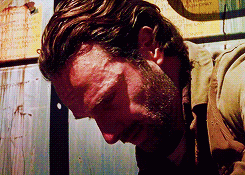
Season 4: Rick’s monumental character development this season is transitioning from Farmer Rick to peak Savage Rick. And he officially says goodbye to Farmer Rick during the unforgettable jugular bite against Joe and the Claimers, a moment experienced only by Rick and three others from TF, his closest people Michonne, Carl, and Daryl. And of course, protecting Carl is Rick’s biggest motivation here but knowing those Claimers had horrible plans for Michonne too…None of that was happening on Rick’s watch. Farmer Rick had to go to save Michonne, Carl, and Daryl and thus the feral Savage Rick era was born

Season 5: As one of the seasons with the most fascinating character study of Rick Grimes, this season is all about Rick being on edge and unsure who to trust. But even amidst his mental spiral, he always finds himself trusting Michonne. Rick makes two huge decisions this season - to bring the group to Washington and then to bring the group to Alexandria which greatly impacts the plot going forward. And both times his willingness to take the leap is completely due to Michonne. When she’s vulnerable with him and expresses what she thinks is best, Rick is a real one who trusts her gut even over his own. The two operate as true partners and he lets her lead him and everyone toward what ends up being tf's home for the rest of the series.
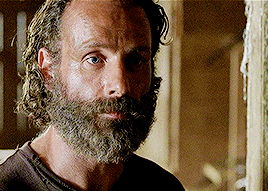
Season 6: Rick has two impactful character shifts that occur in 6A & 6B. In the first half, Rick’s journey is about finally embracing the Alexandrians as his own people, and who most helps him see that? Michonne. Especially in that scene on the porch where he looks at her like she’s just pure mesmerizing. It shows Michonne is instrumental in helping Rick understand that they’re catching their breath in here and anything else is excuses. (And Rick's next scene is him helping Tobin, showing he’s listening to her) Then in Rick’s words to Carl at the end of No Way Out, impeccably acted by Andy, his 6A arc concludes with him turning a new leaf as a character and realizing the people of that town really can make it.
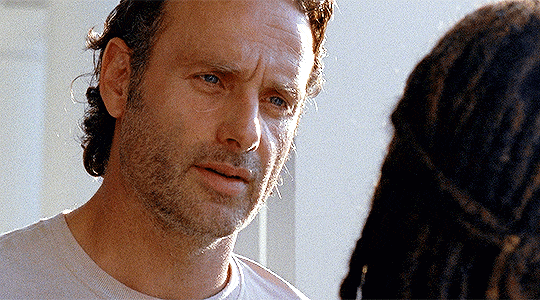
And now in 6B, we get a very confident Rick...And you can’t tell me that him finally having the Baddest Chick in the Game isn’t one of the reasons why he’s feeling himself. 😌 Like he is on top of the world once Richonne becomes official. But that confidence turns into a bit of hubris and devastating series-shifting consequences ensue in the finale.
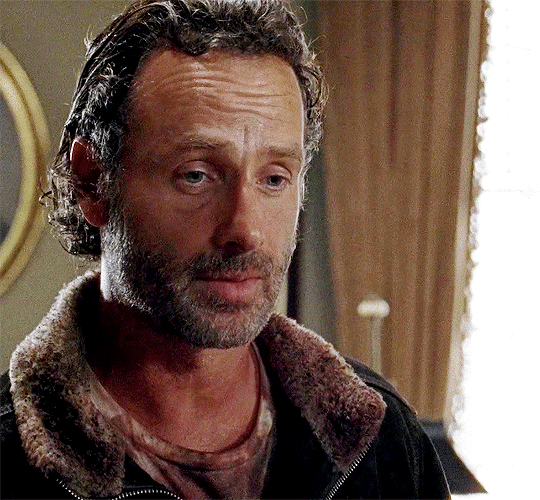
Season 7/8: Andy said it perfectly himself when he referred to Michonne as key in season 7. At the group's lowest point, it’s Michonne, in a flawlessly acted monologue from Danai, who helps Rick fully accept that it’s finally time to fight back against the Saviors, a choice that impacts the whole next half of the season and season 8. And when Rick’s character undergoes a massive turning point as he and Michonne experience the worst pain of losing Carl in S8, Rick slowly but surely comes back to himself after diving off the deep end largely thanks to Michonne’s love and support.
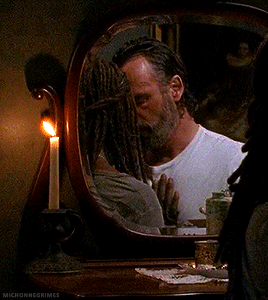
Season 9: Rick’s whole state of mind in season 9 is genuinely hopeful and content as he seems to be in the process of learning to honor the memory of Carl while optimistically building for the future. He believes in the bridge, he believes all the people will come around (because he and Michonne did), and he believes the world can be stable enough for him to have a child with the love of his life. So much of this impactful character development from Rick is a testament to his relationship with Michonne and their ability to help each other heal.

So all that to say, Richonne is so much more than some side love story to the main plot, it’s unequivocally vital, foundational, and influential to the whole TWD series & Michonne is indispensable to Rick’s journey and character growth. Rick Grimes is of course a goated protagonist all on his own…but he didn’t want it to be just him being a boss on his own. He made it clear he wanted Michonne by his side through it all. Because Rick knew what we know - which is that Richonne is absolutely key. 💜

196 notes
·
View notes
Text
20 Things We as Trans Wish We Knew Before Transitioning
@outfitqueer 🏳️⚧️
Did you know that the journey of transitioning often reveals lessons that only become clear in hindsight?
When I reached out to fellow trans individuals and asked them what they wished they had known before their transition, here’s what they told me:
@outfitqueer 🏳️⚧️
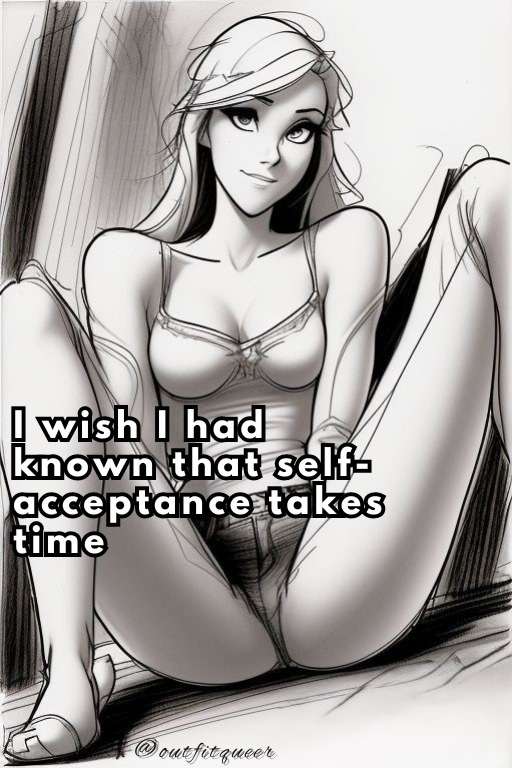
“I wish I had known that self-acceptance takes time. It’s a process that unfolds gradually. It wasn’t something that happened instantly for me.”
@outfitqueer 🏳️⚧️
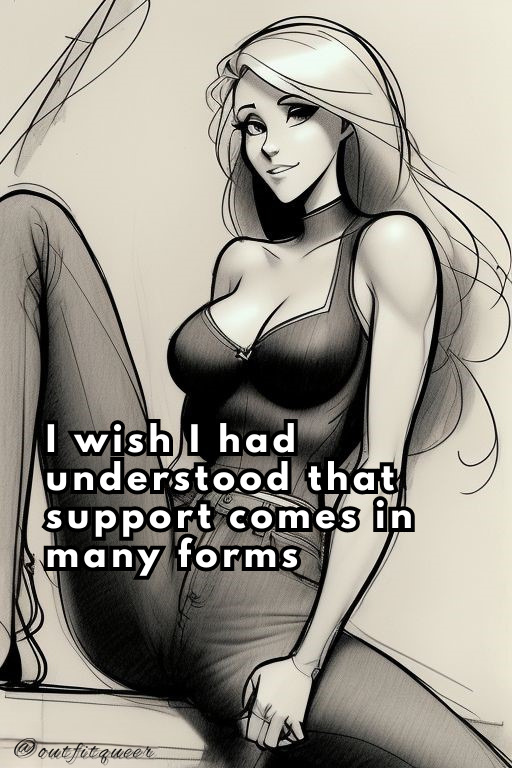
“I wish I had understood that support comes in many forms. You might not find it where you expect, but new sources of support will appear in unexpected places.”
@outfitqueer 🏳️⚧️
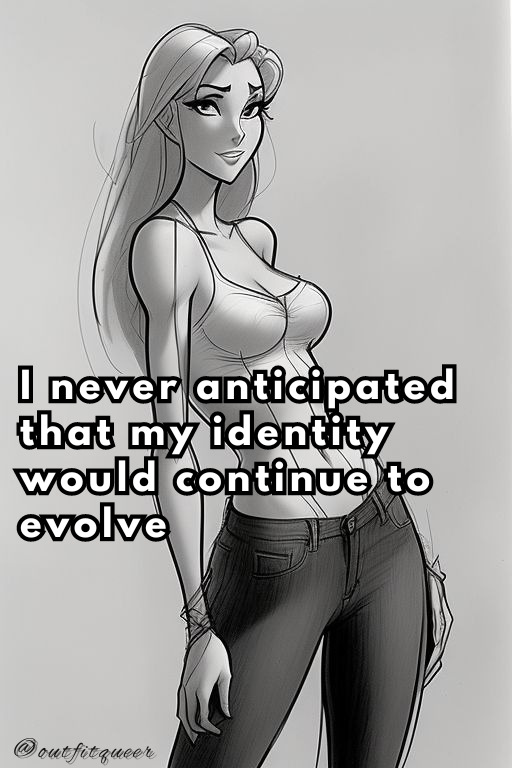
“I never anticipated that my identity would continue to evolve. I thought transitioning would be the end of my self-discovery, but it turned out to be just the beginning.”
@outfitqueer 🏳️⚧️
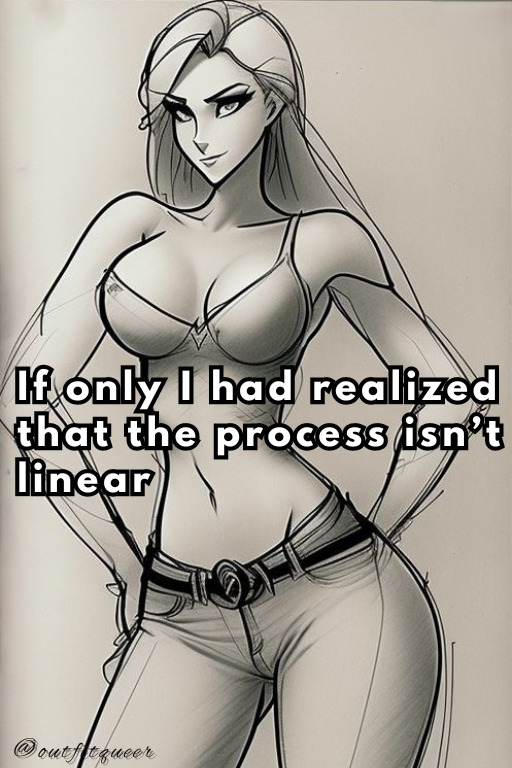
“If only I had realized that the process isn’t linear. There were so many twists and turns along the way. It’s normal to feel like you’re moving backwards sometimes.”
@outfitqueer 🏳️⚧️
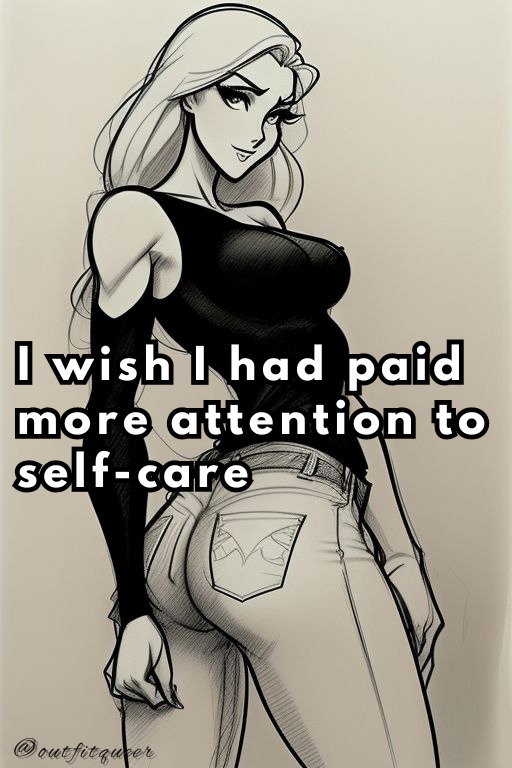
“I wish I had paid more attention to self-care. I didn’t fully grasp how important it was to nurture my mental and emotional health throughout the transition.”
@outfitqueer 🏳️⚧️
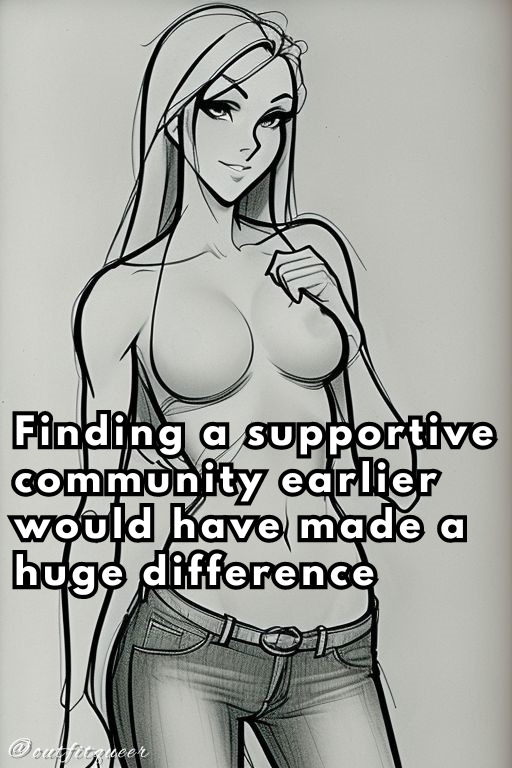
“Finding a supportive community earlier would have made a huge difference. I didn’t know how invaluable it would be to connect with others who truly understood me.”
@outfitqueer 🏳️⚧️
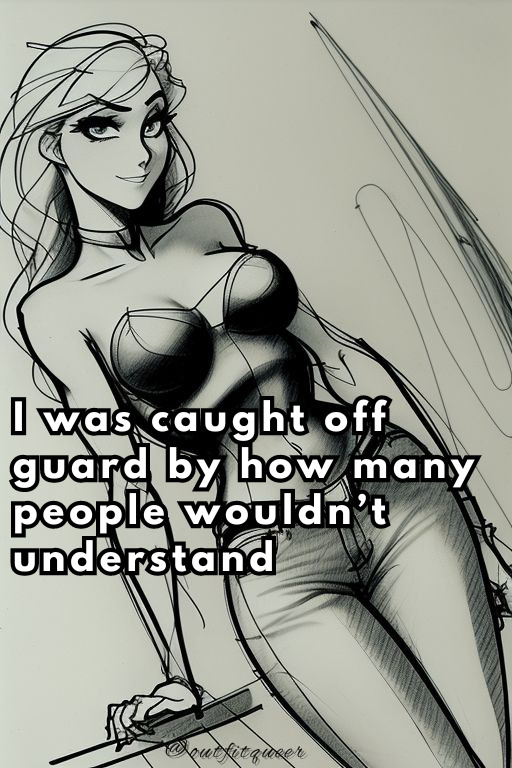
“I was caught off guard by how many people wouldn’t understand. If I could do it over, I’d prepare myself for the ignorance and work on being patient and educating others.”
@outfitqueer 🏳️⚧️

“Patience would have been a great ally. Transitioning and gaining acceptance took much longer than I expected. I wish I’d been more patient with myself and others.”
@outfitqueer 🏳️⚧️
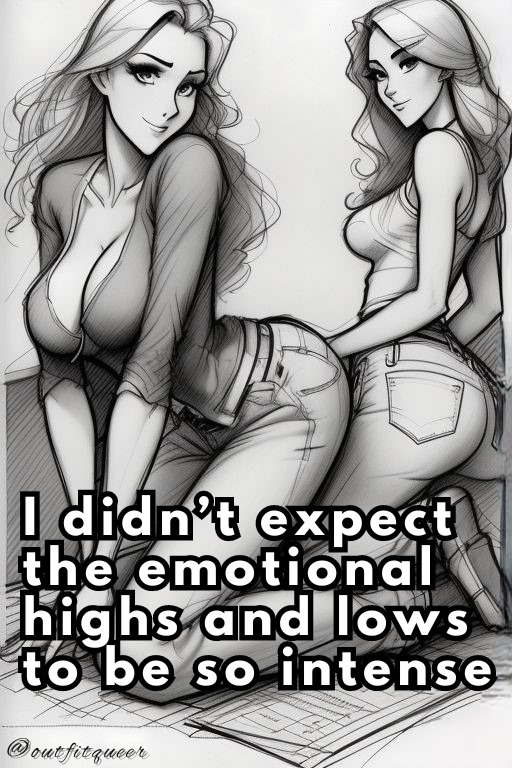
“I didn’t expect the emotional highs and lows to be so intense. Recognizing and accepting these fluctuations would have helped me cope better.”
@outfitqueer 🏳️⚧️
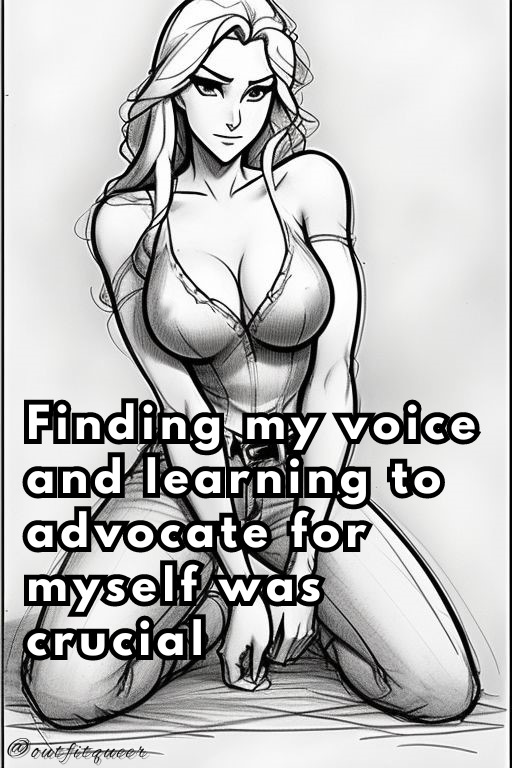
“Finding my voice and learning to advocate for myself was crucial. I wish I had realized sooner how empowering it would be to speak up for my needs and experiences.”
@outfitqueer 🏳️⚧️
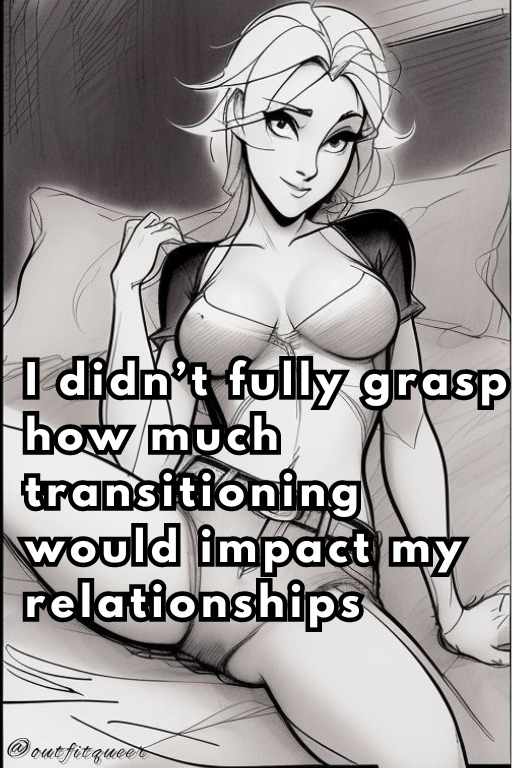
“I didn’t fully grasp how much transitioning would impact my relationships. If I could go back, I’d be more prepared for these changes and how to navigate them.”
@outfitqueer 🏳️⚧️
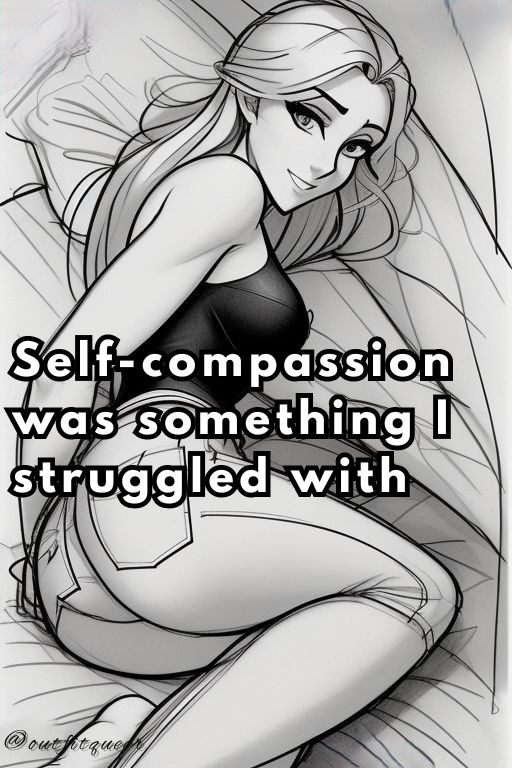
“Self-compassion was something I struggled with. I wish I had been kinder to myself during the tough times. It’s important to remember that setbacks are part of the journey.”
@outfitqueer 🏳️⚧️
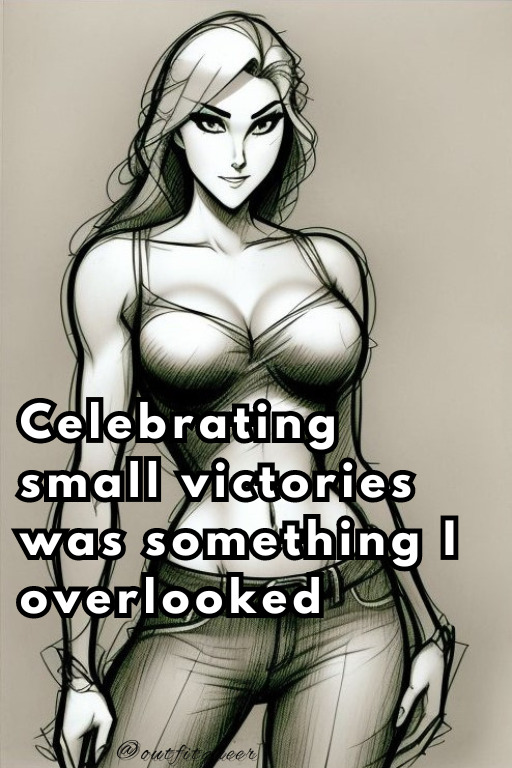
“Celebrating small victories was something I overlooked. I wish I had focused more on acknowledging and enjoying my achievements along the way.”
@outfitqueer 🏳️⚧️
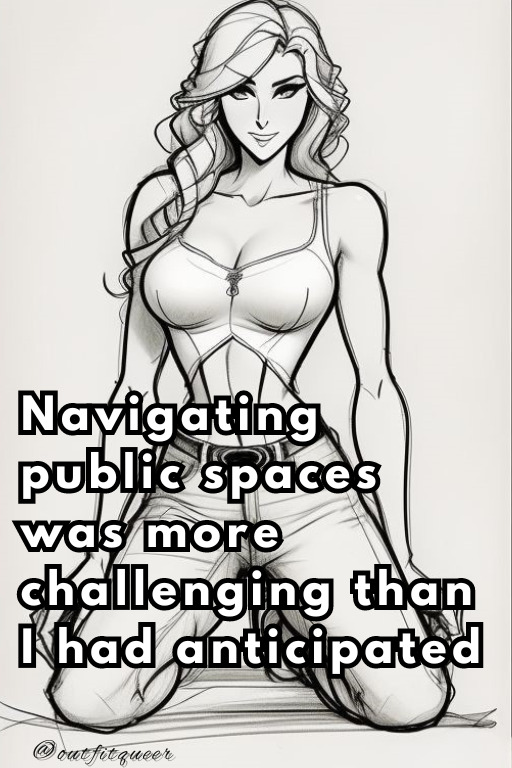
“Navigating public spaces was more challenging than I had anticipated. I wish I had been better prepared for the complexities and how to handle them.”
@outfitqueer 🏳️⚧️
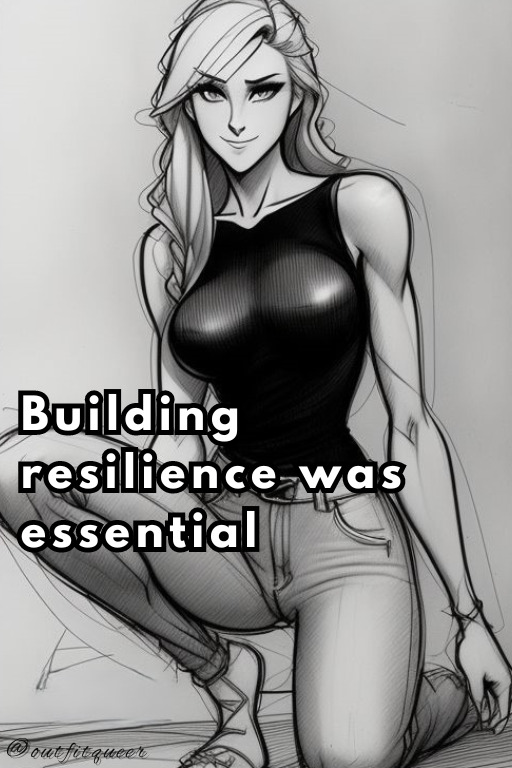
“Building resilience was essential. I learned that developing inner strength helps in facing challenges and setbacks. I wish I had understood its importance earlier.”
@outfitqueer 🏳️⚧️
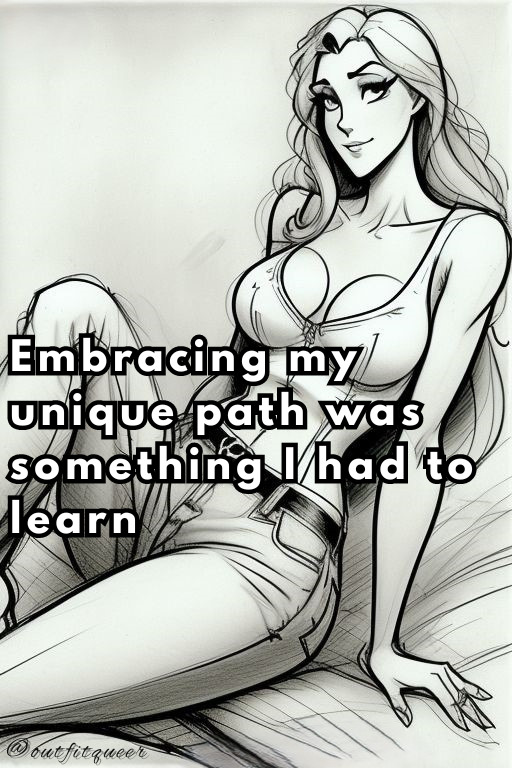
“Embracing my unique path was something I had to learn. Comparing my journey to others was unhelpful. I wish I had focused more on my own experience.”
@outfitqueer 🏳️⚧️
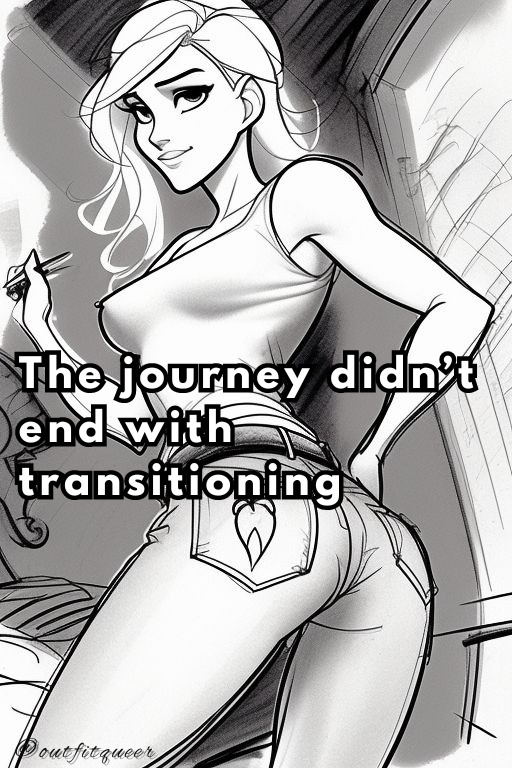
“The journey didn’t end with transitioning. Personal growth and self-discovery continued beyond that. I wish I’d known that there’s always more to learn and explore.”
@outfitqueer 🏳️⚧️

“Financial planning is something I wish I’d focused on more. Transitioning came with significant costs, and better budgeting would have eased some of the stress.”
@outfitqueer 🏳️⚧️
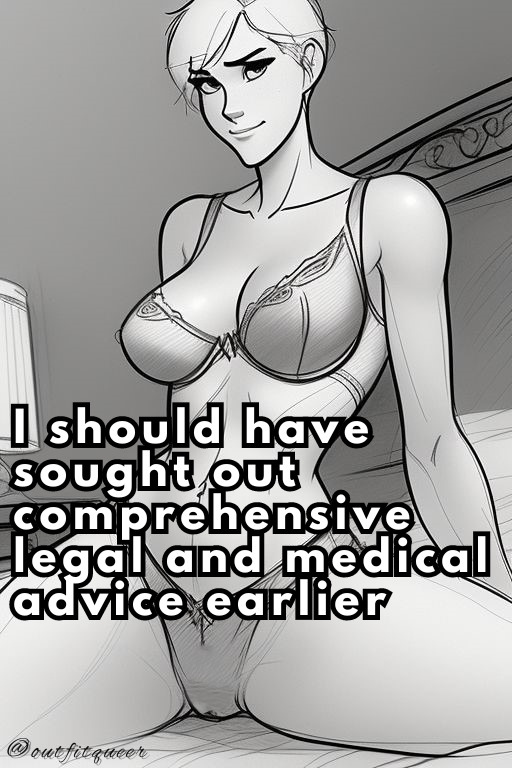
“I should have sought out comprehensive legal and medical advice earlier. Having a better understanding from the start would have made many decisions easier.”
@outfitqueer 🏳️⚧️
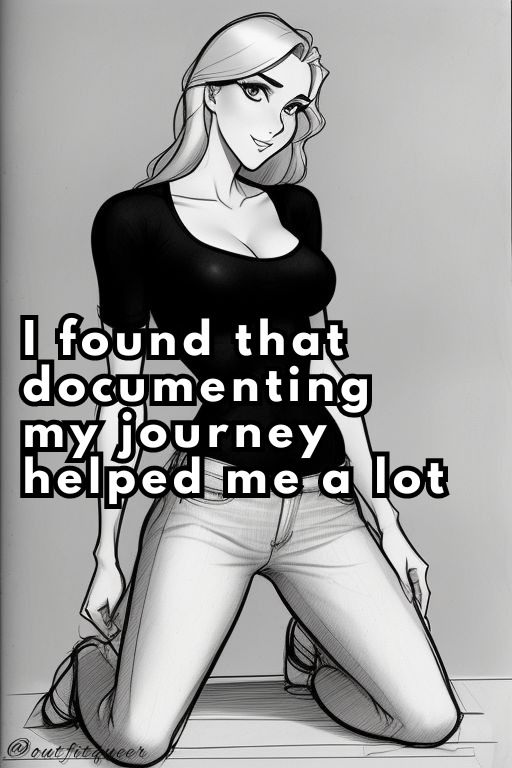
“I found that documenting my journey helped me a lot. Keeping a journal or recording my experiences provided a way to process the emotional ups and downs.”
@outfitqueer 🏳️⚧️
#trans artist#mtf trans#queer nsft#trans#trans beauty#trans man#trans nsft#trans pride#trans women are beautiful#transsexual#trans rights#trans are beautiful#trans are women#trans artwork#transformation#trans woman#transfem#transgender#transmasc#transformers#transgirl#transisbeautiful
38 notes
·
View notes
Text
what i love about sally bowles is how human she is.
so often times in theatre, but generally in any storytelling medium, is the notion for the main character to be morally superior.
when a character makes mistakes, or is clearly in the wrong, the audience overlooks the meaning behind writing those errors and chalks it up to the author being evil.
i love cabaret because you’re conflicted with empathizing with the characters, but also wanting to yell at them to look around the chaos they’re abiding by.
i see this more clearly in dear evan hansen. those ive discussed with who dont like the musical usually explain it’s because evan is manipulative and has an inferiority complex.
but that’s what’s beautiful about dear evan hansen. he’s so representative of how mental illness can destroy not just our will to live, but our moral compass as well. evan is the literal definition of “hurt people hurt people.”
in summation, i believe a story where the audience is forced to reckon with the cruel natures of a narrator is so beautifully complex, and more impactful.
#dear evan hansen#cabaret#sally bowles#theatre#musical theatre#writing#morals#stories#evan hansen#playwright
18 notes
·
View notes
Text
One aspect of rise!Mikey that I feel like gets often overlooked (and that I love elaborating on in my series) is that he seems to have the type of personality one chooses to develop by themselves.
What I mean by that is that yes - he is the most emotionally mature of his brothers and yes - he's most likely an empath by nature, but there are some moments in the series that would feel 'out of character' for a typical sunshine/heart of the group kind of character.
Probably most memorably in "Pizza Pit", where he goes on full on feral, to the point where Raph as to actively hold him down (noteworthy for this take is that he says "I'm usually a peaceful turtle"). And he does his iconic "evil" laugh. And while Donnie and Leo say: "Should we be worried about him?" "... Probably.", Raph doesn't seem at all bothered by his behavior, which leads me to think that this has happened before, perhaps while Mikey was in a not-so-good mental state, like im this episode.
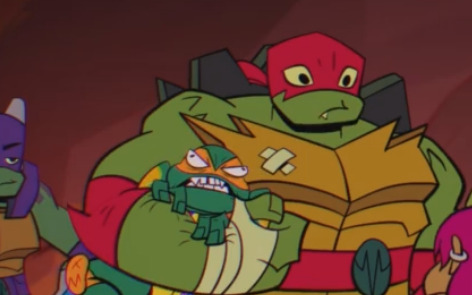
There's also "Doctor Delicate Touch" and "Doctor Feelings" (both of which I'm going to over interprete because fuck it, I AM making it THAT DEEP). What's interesting about these characters is that, while Doctor Feelings feels like something a kid would come up with to get through his emotionally constipated brothers (and seems to be a relatively new thing, since Donnie didn't recognize him like he does Dr DT), Dr Delicate Touch is more interesting. He's loud and blunt, mean, but all for the sake of accomplishing a certain goal, and as Mikey put it: "he feels nothing". He usually comes up when they run out of other resolutions to a problem, or in deeply frustrating moments. To me, this feels like a way for Mikey to vent out his emotions/resolve a problem in a way he would naturally lean towards, without the outburst impacting his role in the family or the way his brothers view him.
In short words - Dr Delicate Touch is Mikey's natural personality.
All of this leads me to believe that by nature, he leans more towards chaotic neutral rather than the chaotic good usually associated with him, and his personally would reflect that more if he grew up an only child.
To be clear - I don't think actively 'choosing' your personality or reshaping it a certain way makes it any less real, or that he's pretending in any way. This is just something some people do while growing up.
So what I'm saying is that while, for example, Raph seems to have just naturally fall into the role of a leader because of the type of person he is(as basically canonically confirmed), to me Mikey feels like he deliberately choose to be the sort of emotional support/glue to his family on purpose, and reshaped his personality to fit after.
#this is a show for 7 year olds and yes I AM making it THAT DEEP#this post appeals to me and like#maybe one other person that sees his charcater the same way#again this is my opinion but if you have any thoughts please share I love to discuss these little guys#character analysis#tmnt#rottmnt#rise of the teenage mutant ninja turtles#rise of the tmnt#tmnt michelangelo
37 notes
·
View notes
Text



ATHLETES FOR PURPOSE: Meet the Athletes Using Instagram For Good
The Race for Mental Health Awareness
In the fast-paced world of Formula 1, there’s another race that George Russell is also focusing on - the race for mental health awareness. "I wanted to go on a bit of a journey to find how mental health can affect us and those around us," George explains. "It's something that affects us all, including myself, and there have been times when I didn't have the courage to speak up about it and talk to someone."
"At the start of the year, I saw it as an opportunity to make a fresh start," he reflects. "But making that step isn't always easy. While many of us focus on our physical health, our mental well-being can often be overlooked. That's why last year I promised to educate myself more on the subject."
Despite a busy racing schedule, George made time to meet with industry professionals to discuss the importance of mental well-being, sharing these meetings with his followers on Instagram. "During the year, I've spoken to people who volunteer their time to help those who are struggling, with the aim of raising awareness of the resources available. I hope people take away from it the courage to speak up if they are struggling with anything." One highlight was his visit to Self Space in London, the UK's first mental health drop-in center on the high street. George describes it as one of the most enlightening and humbling experiences that he can remember. "Visiting Self Space was really special, and I learned so much that day." His biggest takeaway? "The importance of speaking up in the early stages if you're struggling. So many people leave it very late to seek help, particularly men, but by removing the stigma around how mental health is perceived, we can enable others to get the support they need."
George also sat down with footballer Harry Kane, England's captain and record goalscorer, to discuss their experiences so far. They also discussed what more can be done by those in the public eye to raise further awareness about mental wellbeing. "I hugely admire Harry as an athlete and as an individual. It was a special experience, speaking with Harry so candidly about our perspectives on mental health and wellness." Sharing these conversations and being so open has garnered a hugely positive reaction from fans, fellow athletes and from those close to him. "The reaction has been very positive." he notes "It’s such an important topic and I’m really pleased to see what we’re doing having a positive impact in enabling many people, including myself, to better educate themselves."
29 notes
·
View notes
Text
unpopular opinion and dt spoilers
regarding that reddit thread, i don't think it ultimately matters how the soul, memories and life force are different. i'm not big on concrete lore in general, but that's because my experience with people obsessing over concepts in lore often encourages people to behave as though there are objective truths that are unbendable/ unbreakable/ unadaptable.
also, the perspective of this original poster disagreeing with one of the commenters on the ethos of alexandria as it's laid out in the story... their argument reeks of cultural blindness and bias. it's not that their clarification isn't adding something, but rather that they prioritize the hard lore of an imaginary world over the way that world is connected to concepts in the real world. this is a mentality i have commonly encountered over the last seven years, that lulls people back into a dream to forget reality altogether.
i love it when people use lore for interesting concepts in their own stories, and when they interpret between the lines and when they exploit new possibilities from subtle details that are often overlooked. the creativity behind this involves a lot of thinking, which is beautiful to witness and exciting to explore.
the other thing is... the alexandrians are an invading force. that doesn't mean they aren't human. it means they're both. we must always remember that people can do bad things for reasons they deem acceptable. we can empathize with them, but it isn't the same as forgetting their actions and completely absolving them of their mistakes. forgiveness is the willingness to help someone who wants to change, without holding their past against them irrationally. when their behaviors begin to show a lack of remorse and reflection, that is when trepidation toward the person is rational.
and these are very broad ideas to describe a very specific kind of situation. i realize that. but what's worse to me is that people might use the specifics of this lore to completely absolve sphene and her subjects who created the system. sphene was a lovely person and i found myself weeping for her through the alexandria dungeon. i still do. but we can't forget that her choices were incredibly flawed. the same applies for the japanese empire, and how its impact echoes into society today.
my wife made some good points:
"Also yeah it doesn’t matter because the point is, their own society doesn’t have enough energy to sustain them. So they’re killing other people to perpetuate their system. Seimei ryoku is gone once it’s used to sustain the Endless. It’s easier to think of this as all these things make up a human, but the fact of the matter is these things that make up who an individual is, is nothing more than a resource to the Alexandrians. They rationalize it by people’s memories are uploaded to the cloud so they never die, truly, so you can use their parts and you’re not REALLY doing anything bad. But the thing is this kioku isn’t real. It’s not the true, spiritual memory of the person, it’s an artificial memory of that person. The real kioku is being stripped away and erased. "Honestly, I think people are getting too caught up in the semantics and the big picture is that the Alexandrian system is a place where people have culturally accepted the monetization of humanity itself."
i know it is difficult to sit in the middle between love and anger. it is a painful way to live. but it's what life is, and what being a responsible person is about. accepting the good and sifting out the bad doesn't mean something is hateable. it does mean we should encourage people to resist and deny harmful practices, even if they are culturally ingrained and therefore historically validated in the minds of the people.
people in remote parts of india believe in child marriage and in abandoning or killing infant girls because they believe girls only bring bad luck, that to do well in the future, you must rely on boys. this is what i saw in mamook during the rite of brotherhood questline. of course, they never spelled out how the villagers explicitly suffered when it came to the stillborn children, except that it produced streams of guilt and grief, and a giant burden for the survivors. but it's hard not to see them as parallels.
i truly believe this is how we're meant to see the alexandrians. they have accepted this way of life because they believe it maximizes the joys they experience by living. the writing implies it is a cultural issue. even so, as the cornservant quest in solution nine shows, they are losing important aspects of life that allow us to truly enjoy it.
so, you know... i enjoy clarity on the lore. but it hurts my heart when people use it to close their eyes to unfortunate truths.
#ooc;;#i'm not looking for a debate or conversation about this#i just really needed to have this said SOMEWHERE in the universe so i could let it go
8 notes
·
View notes
Note
*knocks on door*
Your writing is BEAUTIFUL and I just want you to know this 。:゚૮ ˶ˆ ﻌ ˆ˶ ა ゚:。 You have no idea how much you just twisted my heart with only three paragraphs abt such a wonderful perspective we never get on Angeal shshshhsh- like seriously!! So much that I had to invade your inbox xDD (I do selfishly hope that WIP is continued buuttt that’s just me 🤣❤️) Keep staying awesome, Pumpkin!!
asdfghjk thank you <3 I have too many thoughts about Angeal that I choose to keep to myself because I don't think anyone else will care. He's a very tragic character whose narrative in Crisis Core often gets overlooked in favor of Sephiroth's, Zack's, and Genesis', even though his story is equally as tragic.
I think a lot about how Sephiroth had Hojo, Genesis had Hollander, but Angeal had his mother, the woman who raised him, loved him, and chose to keep the truth from him. She let him find out on his own about everything that was done to him and that she was complicit in. He found out that his own mother had a hand in what was happening to him and Genesis, that he was nothing but a science experiment to her, and then when Angeal confronted her about it, she killed herself. Zack walks into Gillian's house and sees her dead, with Angeal watching her lifeless body. His only response after Zack thought he killed her was "My mother did not deserve to live, and neither does her son" like THE IMPACT that statement has oof.
If I ever turn that WIP into something, it would focus on Angeal's childhood, how it shaped him as a person, his mental health before the crisis and during it (because I'm of the hc that he was depressed wayyy before the crisis).
SORRY FOR THE RAMBLE that probably makes no sense because my brain is running on empty right now lmao
14 notes
·
View notes
Note
Hey!
I have a what-if question: what would have happened if Lestat didn't turn Claudia that night? If he told Louis he can't make vampire out of child no matter what?
I know Claudia was band aid for their marriage and we could clearly see wheels turning in Lestat's head when Louis was begging, he knew with a child Louis would be reluctant to leave, but what if common sense won that night and Lestat said that it's against vampiric law?
How do you think Loustat relationship would go after that? Because just before coming back with Claudia, Louis basically left Lestat (Was he intending to break up permanently? ). Logically, Lestat not helping Louis redeem himself (in his head) would drive him away further.
But Claudia was also their greatest mistake. While she definitely helped Louis with his depression, repaired some damage in their marriage, all of it went downhill because she was too young. And the way she mended Loustat, she broke them within once she aged and horror of her situation sank in (not blaming her! Loustat were incredibly selfish bargaining with poor orphaned burned girl and then trapping her in miserable life for what they thought would be eternity)
Do you think if Loustat somehow came together without Claudia their life together would go better? Do you think there was even a chance for them to repair their marriage on their own (I mean without separating for decades)? And also how much Claudia dying on Louis from burns would impacted his mental health? Would he get fully depressed? She was supposed to be his redemption in his mind and her dying would definitely affect him even though he didn't love her then.
Thank you!
Hey! So... it is important to remember that Lestat lets people go if they really want to.
I firmly believe that he would have let Louis go then, too, if he had really wanted to. I also believe that he would have watched over Louis from afar then, because he knew Louis was a comparatively weak vampire, stuck right in the rite of passage.
But... Louis didn't really want to leave. He came back with Claudia, after running off, and Claudia was an offering, an excuse. That excuse would be missing then... but Louis would have come back sooner or later anyways, because this was the home he shared with Lestat, and this was NOLA, where he accomplished so much. And because Louis loves Lestat. And the problems they have... are not from a lack of attraction or love.
I can see them enter a similar relationship to the one Armand and Louis share, later. Love and despair, and numbness, side by side, for a while. Because without Claudia as a "band aid" the focus would have been heavily on the actual issues, and even though these issues would have been hard to stomach they probably would have been resolved sooner. And as per depression - Lestat can do depression, too (does in the show, which seems often overlooked, and it is a big thing in the books). I bet he and Louis would have spent very gloomy times together, like the "laying low" in episode 5.
I could see Louis travel, alone or with Lestat as his protective shadow, and then encountering the others, the vagabonds, the revenants, the covens.
Sooner or later Louis would have come to the same realization season 2+ will bring him to, namely that Lestat is actually not the Big Bad™ out there. He would have needed to face the realizations coming with the rite of passage, and the realities of the vampires in this universe, that this is his life now, and the consequences that come with that.
He would have needed to accept himself, eventually. And by accepting himself he would have been ready to accept the love (and thereby Lestat), too.
It would have been a vastly different story, true... but I think the outcome might have been similar. In the end, at least.
#Anonymous#asks#ask nalyra#amc iwtv#iwtv#amc interview with the vampire#interview with the vampire amc#iwtv amc#iwtv 2022#interview with the vampire#lestat de lioncourt#louis de pointe du lac#loustat
21 notes
·
View notes
Text
Can Calcium Deficiency Cause Anxiety?
Adequate calcium intake is necessary for emotional stability and mental health.
Nutrients are commonly thought of as only affecting the body, but they also have a significant impact on brain function.
Have you ever taken antidepressants and felt like something was still really wrong?
Nutritional deficiencies are one of the major factors that can affect not only our physical health but also our mental health, in ways that often go unnoticed.

Almost all psychiatrists recognize the impact of nutritional deficiencies, such as vitamin B12, on psychiatric health. However, the psychiatric symptoms of other nutritional deficiencies, such as calcium and magnesium deficiencies, are often overlooked. Typically, integrative psychiatrists will consider nutrients and micronutrients and their impact on mental health.
This is especially challenging if you are suffering from:
Anxiety
Depression
Obsessive-compulsive disorder (OCD)
Most people think of calcium as a bone nutrient, but it also affects mental health. Research shows that calcium deficiency can impair mental health. This is because calcium is needed for neurons to generate and release mood and emotion-regulating neurotransmitters. Its deficiency can cause anxiety disorders, the most common mental health condition.
Can Calcium Deficiency Cause Anxiety?
Indeed, calcium deficiency can lead to anxiety issues. While most cases of anxiety are the result of a complex interaction of psychological, environmental, and physical factors, some sufferers may be deficient in this important mineral.
How Calcium deficiency can cause anxiety:
- Calcium is needed to synthesize brain-calming neurotransmitters, such as GABA, which keep our brains peaceful and tranquil. Reduced GABA, possibly due to low calcium, may lead to increased anxiety.
- Calcium's role in balancing between excitatory (glutamate) and inhibitory (GABA) signals is less well-known, yet crucial. Insufficient calcium can lead these brain neurons to hyperexcite (imbalance), causing or worsening anxiety and even leading to panic attacks.
- Calcium is needed for muscular function, including breathing muscles. Rapid, shallow breathing is common with anxiety. Inadequate calcium levels may increase respiratory issues and exacerbate anxiety and breathing issues.
Imagine millions of people who suffer from anxiety, unknowing that deficiencies in this essential mineral may be the cause. Therefore, it is important to screen for nutritional deficiencies, especially calcium deficiency, for mental health.
Why is calcium deficiency commonly overlooked?
Calcium deficiency is frequently misdiagnosed, and it does not show up on routine blood tests unless calcium levels are dangerously low. This is because, even when a person is deficient in calcium, the body still draws calcium into the bloodstream to support the heart and other vital organs. But less calcium will cross the blood-brain barrier, so psychiatric effects may show even before a calcium deficiency is diagnosed.
‘Calcium deficiency can cause psychiatric symptoms before physical signs appear.’
An integrative psychiatrist would consider these nutritional deficiencies while screening and treating anxiety, ensuring long-term mental and nutritional health.
Integrative psychiatrists at GABA Telepsychiatry consider:
- Nutrition
- Hormones
- Medical illness
- Psychosomatic causes of symptoms
- External stressors
- and more
With these factors in mind, our psychiatrists help manage anxiety and other mental health issues in their patients.
Of you want to know more about integrative psychiatry visit our website https://gabapsychiatrist.com/integrative-psychiatrist/ or call +1(833)312-4222
#mental health#healthcare#health & fitness#online psychiatrist#mentalhealthawareness#integrativemedicine#integrative psychiatrists#calcium deficiency
2 notes
·
View notes
Text
By: Ted Balaker
Published: Mar 27, 2025
Greg Lukianoff and Jonathan Haidt began the Coddling project roughly a decade ago—their Atlantic cover story was published in 2015—and back then social media skepticism wasn’t terribly common, at least compared to today. These days voices as varied as morning shows and the U.S. Surgeon General routinely explore the dangers of social media. Often those sounding the alarm overlook other aspects of the Gen Z mental health crisis, such as the decline in free play.
But social change is a messy process, and maybe we should adopt a glass-is-half-full perspective. At least lots of people are now taking a hard look at social media’s impact on anxiety and depression. And let’s also embrace new developments that suggest some of the same forces that fueled social media obsession might be prompting young people to step away from the endless scroll.
Here’s how Newsweek puts it:
For many, the ultimate social currency no longer appears to be how many followers you have, but how few social media platforms you use and if they are on private mode. More young people are deleting their accounts, adopting old-school flip phones, picking up analog hobbies and embracing digital minimalism. Film cameras, paperback books and even "dumbphones"—simpler mobile devices without addictive social features—are making a comeback.
Once seen as outdated, being offline is now perceived as a luxury in a world where everyone is perpetually plugged in.
The writer taps an expert to weigh in on the trend. Francesco Bogliacino is a behavioral economist at the Università Cattolica del Sacro Cuore in Milan, Italy. He says it makes sense that going offline has become cooler among younger generations.
"It reflects the desire for intentional, high-quality content consumption," Bogliacino told Newsweek. "Being disconnected from social media is becoming a status symbol and selective newsletters and blogs represent costly signals.
He added, "We are also more aware of the harmful effects of social media like mental health issues, polarization and misinformation."
Promising Anecdotes
Newsweek also heard from some 20-somethings including Kate Cassidy Fletcher, who lives in New York and used to work for TikTok. She recently made a popular YouTube video about how leaving social media changed her life for the better.
youtube
As is so often the case among Gen Z, Fletcher became engrossed in social media in middle school:
"It felt innocent and fun," she said. "But we were being trained, subconsciously, to prioritize screen time over real-world interaction."
Working for TikTok during the pandemic made her hyper-aware of the platform's impact on attention spans, mental health and parasocial relationships.
"A statistic we would use in our sales pitch to advertisers was that the average daily time spent was 92 minutes a day scrolling TikTok videos," Fletcher said. "That is over an hour and a half of constant dopamine hits from the second you open the app."
Not only did she eventually quit social media, she quit cold turkey. She experienced some withdrawal, but soon those anxious feelings were replaced by a new sense of clarity.
"I feel like the truest version of myself knowing I am not being influenced by trends," she said.
"A younger Gen Z coworker immediately reacted to my decision by saying, 'wow, that is such a flex'. "It looks like this attitude is gaining traction among younger people."
From Anecdote to Trend
YouTube is packed with videos like Fletcher’s, where young people enthuse about deleting TikTok, Instagram, and so many other time-sucking apps. Add to that the recent cultural shift among media outlets and political figures, and it does seem like Fletcher’s attitude is gaining traction.
Unfortunately, the Newsweek piece doesn’t include any actual data on trends.
We shouldn’t cheer a trend until we can establish that the trend actually exists. On the other hand, the first sign of a trend is often widely-reported anecdotal evidence. That’s how the story of the Gen Z mental health crisis unfolded. University counselors were the canaries in the coal mine—they reported being inundated with anxious and depressed students.
Years later, a flood of data confirmed the counselors’ worries. Young America was indeed in the midst of a crisis. For now, we can only hope these YouTubers who turn their backs on social media are reliable forerunners. But how beautiful would it be if the desire to be cool delivered, not anxiety-inducing obsessions, but a new appreciation for living in real life?
--
By: Melissa Fleur Afshar
Published: Mar 20, 2025
A string of viral social media posts—ironically, online—have made one thing clear: spending heaps of time on the internet, once the great escape of a generation, is no longer cool.
Oxford University Press hinted at a shift when it named "brain rot" its 2024 Word of the Year. The term, which describes the cognitive decay caused by excessive doomscrolling and online saturation, captures the growing disillusionment with social media felt among younger millennials and Gen Z.
For many, the ultimate social currency no longer appears to be how many followers you have, but how few social media platforms you use and if they are on private mode. More young people are deleting their accounts, adopting old-school flip phones, picking up analog hobbies and embracing digital minimalism. Film cameras, paperback books and even "dumbphones"—simpler mobile devices without addictive social features—are making a comeback.
Once seen as outdated, being offline is now perceived as a luxury in a world where everyone is perpetually plugged in.
Francesco Bogliacino is an associate professor of economics at Università Cattolica del Sacro Cuore in Milan, Italy. His research focuses on behavioral and experimental economics, and he told Newsweek it makes sense that going offline has become somewhat cool among younger people.
"It reflects the desire for intentional, high-quality content consumption," Bogliacino told Newsweek. "Being disconnected from social media is becoming a status symbol and selective newsletters and blogs represent costly signals.
"We are also more aware of the harmful effects of social media like mental health issues, polarization and misinformation."
Appeal of Digital Detox
Kate Cassidy Fletcher, a 28-year-old living in New York City, has experienced this shift firsthand. In November 2024, she posted a YouTube video detailing why she deleted all of her social media accounts except for YouTube itself. The video, which has amassed over 80,000 views, has sparked positive comments from viewers.
"As a professional in the advertising tech world and having previously worked for TikTok in their monetization arm, I have been grappling with my own relationship with social media over the years with an acute awareness of how these platforms operate," Fletcher told Newsweek.
She traces her social media history back to middle school, when Facebook and Gchat first became popular.
"It felt innocent and fun," she said. "But we were being trained, subconsciously, to prioritize screen time over real-world interaction."
Working for TikTok during the pandemic made her hyper-aware of the platform's impact on attention spans, mental health and parasocial relationships.
"A statistic we would use in our sales pitch to advertisers was that the average daily time spent was 92 minutes a day scrolling TikTok videos," Fletcher said. "That is over an hour and a half of constant dopamine hits from the second you open the app."
Eventually, she reached her breaking point.
"I finally decided that I had had enough and wanted to see if I could quit cold turkey," she said. "Once I deleted one platform and realized how much better it made me feel, it was a domino effect to give me the courage to finally delete the others."
While she saw a big pay-off over time, Fletcher did not expect how much she would struggle without social media at first.
"I compulsively checked my phone, only to realize there was nothing to check," she said.
But with time, she gained something she had not anticipated—clarity.
It took Fletcher "a serious adjustment period" to get used to life offline, but she soon learned that deleting social media afforded her the freedom from constant external stimulation to tap into her intuition.
"I feel like the truest version of myself knowing I am not being influenced by trends," she added. "A younger Gen Z coworker immediately reacted to my decision by saying, 'wow, that is such a flex'.
"It looks like this attitude is gaining traction among younger people."
Social Cachet of Logging Off
For some, the act of quitting social media is indeed becoming a new kind of status symbol. The wealthiest and most powerful figures in Silicon Valley—ironically, the very architects of social media—have long kept their children away from these platforms.
Now, young people outside of the tech bubble want in. Fletcher believes that being offline does carry some "mystique."
"There can be a touch of intrigue that comes with being unreachable via social media," she said. "But for the most part, friends react with confusion: 'Wait…What do you do with your time?' Then they affirm it: 'That sounds really healthy, I should think about that in my own life'."
For 25-year-old Alex Edwards, the appeal of deleting social media was not about mystique—it was about escaping a digital world that felt suffocating.
'Deleting Social Media Is Self-Care'
Edwards, who runs a business, once believed that social media was necessary for his success. But in 2020, as online culture reached a fever pitch, he began questioning its role in his life.
"Social media went from being a fun, every-now-and-then thing to something I was using on a daily basis—and then an hourly basis," he told Newsweek. "I felt like I could not escape the chronically online society we had become.
"It felt claustrophobic."
Realizing his business did not actually depend on Instagram or TikTok, he made a drastic decision.
"I deleted my Instagram and TikTok accounts, removed most of my friends on Facebook, and locked my account," he said. "The result? Immediate relief and a quieter mind.
"And I have not looked back in months."
youtube
Edwards has no plans to return to mainstream platforms like TikTok and Instagram, deeming the world a better place without them.
"The happiest and most successful people I know actively avoid social media," he said.
For him, quitting social media was not about rejecting technology entirely—but was instead about reclaiming time.
"Over a lifetime, how much does this scrolling time add up to? Months? More likely, years," he said. "Decades for some.
"It is time to step back into the real world."
Even Dating Is Going Offline
The shift towards digital minimalism has even started to affect how people date. Zaahirah Adam, the founder of Hati, a newly-launched dating app, saw an opportunity to make dating less transactional and more intentional.
"Dating apps have not changed in over a decade," Adam told Newsweek. "They have left us stuck in a loop of swiping, texting and ghosting, completely disconnected from what people actually want."
Hati, which eliminates endless messaging in favor of direct voice calls, is built around human interaction rather than algorithms.
"A text does not carry the warmth of a voice," she said. "A laughing emoji on Instagram is not the same as seeing someone's smile.
"I think people are finally waking up to that."
Like Edwards, for Adam, the digital detox trend is not about rejecting technology itself, but about freeing oneself from "meaningless interactions."
"Gen Z is not rejecting technology," the dating app founder said. "They are rejecting vapid interactions and companies that are profiting from our misery."
Ironically, it was on the internet that the rejection of constant connectivity started to gain traction. A string of viral social media posts—yes, on social media—began to weigh up if being online is still cool.
One creator, Tiziana Bucec (@tiiiziana) from Berlin, Germany sparked discussion among viewers online after highlighting how overwhelming a short scroll through a social media platform can be, in a post from 2024.
"Humans are not designed for this," she told her followers, referring to the cognitive overload associated with taking in everything you see online.
The 19-year-old later spoke with Newsweek about how she felt being online without a break.
"I don't think it's healthy to constantly consume so much information," Bucec told Newsweek. "Making the active choice to be offline is definitely becoming more of a luxury, and I think that trend will only continue.
"Many of my friends have already deleted TikTok, and I see that as part of a larger shift."
She said that she has spotted other people around her age seeking "real and tangible experiences"—and by that she meant ones that don't take place on a screen.
"I see people thrifting instead of online shopping or seeing reading books as cool and hot, I think this is because people are looking for ways to reconnect with themselves and the world around them," she added.
Like Edwards and Cassidy, another creator, Amanie Grace, took to YouTube in September, 2024 to share the benefits she felt from deleting her other social media accounts.
Grace told Newsweek that she was inspired to take the leap after watching The Social Dilemma on Netflix, and after realizing that she was placing too much of her attention on platforms like TikTok and Instagram.
She added that excessive social media use led to her comparing herself to other young people with vastly different circumstances and bank accounts to her, which led to her feeling low.
"I do believe though that the next big trend will be something more about community and about real life clubs, like run clubs, pilates and book clubs," Grace, who has spotted business leaning into all things "IRL," told Newsweek. "Still, we will probably be using social media platforms to gather those people together."
Brand consultant and social media creator @eugbrandstrat weighed in on the discourse in a TikTok video from January 13. In it, the creator, who analyzes social and cultural trends, said that "IRL" is becoming a new status symbol.
Other creators complained of cloud services and apps deleting their content, which led to them favoring physical photographs, books and documents over those shared online.
One creator, 28-year-old Kristi from California, told Newsweek that she also believes being offline has become "a new social currency" because it is now less mainstream than being online.
"Social currency has always been about exclusivity and in a world where everyone is constantly online, being offline—unreachable, disconnected, or selective about your presence—is becoming a luxury statement," Kristi, who would prefer to keep her full identity private, told Newsweek. "Instead of oversharing every moment, many people now see curating a quiet, private life as the ultimate social flex.
"Gen Z isn't fully labeling excessive social media use as uncool—yet, but there's a clear shift happening and cracks in the 'always online' culture are starting to show."
Kristi, who creates content exploring cultural trends under @tinysey, has also spotted that young people are craving more "meaningful" ways to spend their time instead of doomscrolling.
"Instead of the performative, hyper-visible online presence that defined the millennial era Gen Z is starting to embrace a more controlled and selective approach to social media," she said. "They're not necessarily quitting, but they are rethinking how and why they engage online.
"We're witnessing digital exhaustion, people are tired of always being online, always being reachable, and seeing the same content recycled by the algorithm, which is why activities like reading have become 'quiet luxury' symbols."
Is Social Media Really Out?
Despite the growing disillusionment, and Gen Z being found to use these platforms less than millennials, social media is likely here to stay. Being online remains a fundamental part of how society operates—how people communicate, organize things and do business.
Even Fletcher acknowledges the tension.
"Would I ever rejoin social media? Maybe for business purposes," she said. "The unfortunate reality is that if you want a message to reach a widespread audience, the internet is an undeniably powerful tool."
Edwards, however, remains firm in his decision to keep away from the apps. The 25-year-old said that he does not miss feeling overstimulated from the moment he opens his eyes to the moment he falls asleep.
"I firmly believe we would all benefit from stepping away," he said. "Social media's sole purpose is to gather data—the new oil—and sell that data to companies.
"It is incredibly dangerous."
For now, the quiet revolution against hyperconnectivity continues. Whether it is a passing trend or a deeper cultural shift remains to be seen, but for a growing number of young people, the ultimate status symbol is no longer a verified badge or a large follower count—it is found in the freedom of being offline and in being able to disconnect.
#Ted Balaker#Melissa Fleur Afshar#offline#social media#social media detox#IRL#in real life#doom scrolling#mental health#religion is a mental illness
2 notes
·
View notes